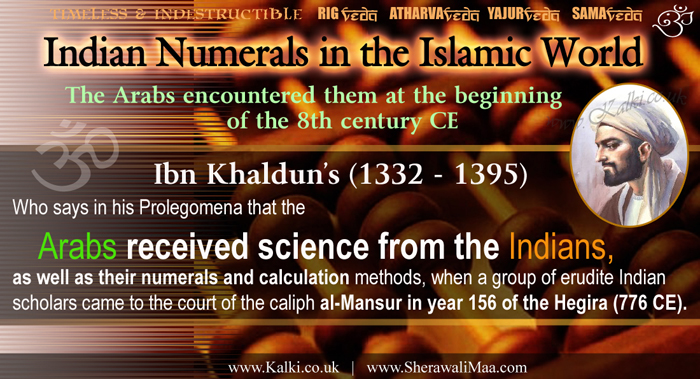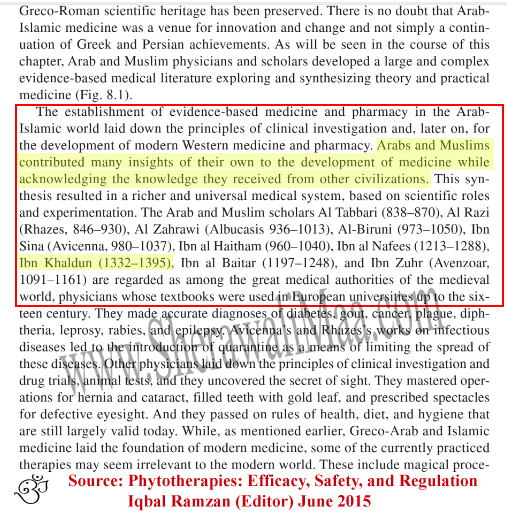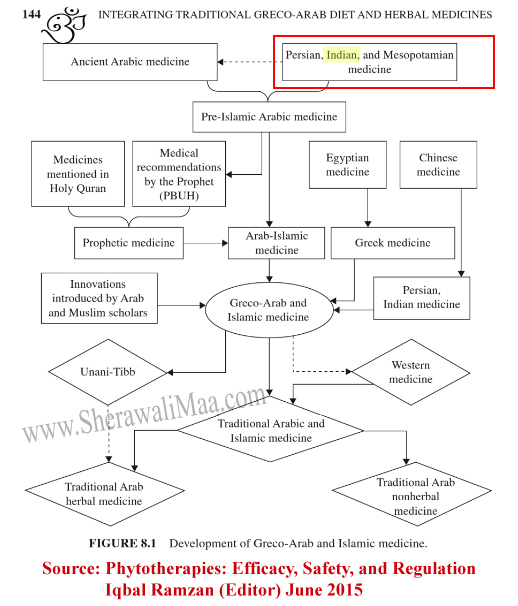BHARAT VARSHA VISWAGURU || ANCIENT INDIANS (Hindus/Sanatani's/Arya'n etc) TAUGHT THE ARABS ||
INDIAN NUMERALS IN THE ISLAMIC WORLD:
Ibn Khaldun’s (1332 - 1395) explanation: Who says in his Prolegomena that the Arabs received science from the Indians,
as well as their numerals and calculation methods, when a group of erudite Indian
scholars came to the court of the caliph al-Mansur in year 156 of the Hegira (776 CE). | Ibn Khaldun is universally recognized as the founder and father of Sociology and Sciences of History. He is best known for his famous 'Muqaddimah,' (Prolegomena). Abd al-Rahman Ibn Mohammad, generally known as Ibn Khaldun after a remote ancestor, was born in Tunis in 732 A.H. (1332 C.E.) to an upper class family that had migrated from Seville in Muslim Spain. His ancestors were Yemenite Arabs who settled in Spain in the very beginning of Muslim rule in the eighth century.
Ibn Khaldun led a very active political life before he finally settled down to write his well-known masterpiece on history. He worked for rulers in Tunis and Fez (in Morocco), Granada (in Muslim Spain) and Biaja (in North Africa). In 1375, Ibn Khaldun crossed over to Muslim Spain (Granada) as a tired and embittered man solely for the reasons of escaping the turmoil in North Africa. Unfortunately, because of his political past, the ruler of Granada expelled him. He then went back to Algeria to spend four years in seclusion in Qalat Ibn Salama, a small village. It was in Qalat he wrote Muqaddimah, the first volume of his world history that won him an immortal place among historians, sociologists and philosophers. The uncertainty of his career continued because of unrest in North Africa. Finally, he settled in Egypt where he spent his last twenty-four years. Here, he lived a life of fame and respect, marked by his appointment as the Chief Malakite Judge. He also lectured at the Al-Azhar University. | Ibn Khaldun is most famous for his book 'Muqaddimah' (Introduction). It is a masterpiece in literature on philosophy of history and sociology. The main theme of this monumental work was to identify psychological, economic, environmental and social facts that contribute to the advancement of human civilization and the currents of history. He analyzed the dynamics of group relationships and showed how group feelings, al-'Asabiyya, produce the ascent of a new civilization and political power. He identified an almost rhythmic repetition of the rise and fall in human civilization, and analyzed factors contributing to it.
|
www.SherawaliMaa.com |
Book:
https://www.amazon.co.uk/Phytotherap.../dp/1118268067


